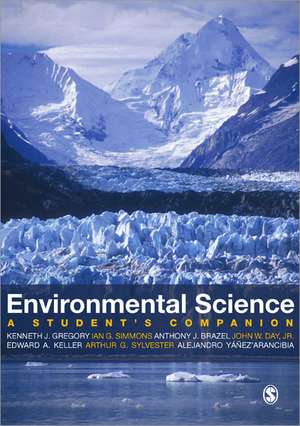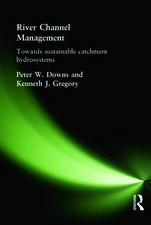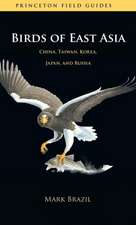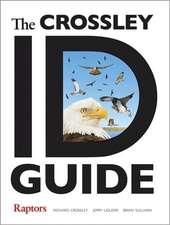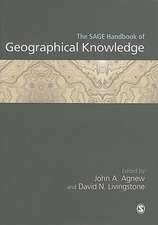Environmental Sciences: A Student's Companion
Autor Kenneth J. Gregory, Ian Simmons, Anthony Brazel, John W Day, Edward A. Keller, Alejandro Yanez-Arancibia, Arthur G Sylvesteren Limba Engleză Paperback – 17 noi 2008
Preț: 488.67 lei
Preț vechi: 574.91 lei
-15% Nou
93.50€ • 97.89$ • 77.37£
Carte tipărită la comandă
Livrare economică 07-21 aprilie
Specificații
ISBN-10: 1412947057
Pagini: 456
Dimensiuni: 170 x 242 x 25 mm
Greutate: 0.75 kg
Ediția:1
Editura: SAGE Publications
Colecția Sage Publications Ltd
Locul publicării:London, United Kingdom
Recenzii
- Professor William L. Graf
University of South Carolina
Environmental science students embarking on their courses in this fast changing area will find this book to be an essential companion, for it provides a wide-ranging, up-to-date summary of all the crucial issues and concepts of which they will need to be aware
- Professor Andrew Goudie
University of Oxford
...a key text that should be on the introductory reading list for any undergraduate environmental science and/or physical geography student. It would be of particular benefit to students starting their studies in environmental science who have no background in the subject, including post-graduate students embarking on a masters' course. I shall certainly recommend that my students purchase a copy
Book Review
Progress in Physical Geography
Cuprins
Introduction
Anthropology
Archaeology
Atmospheric sciences
Biogeography
Biology
Cartography
Climatology
Earth system science
Ecology
Ecosystem
Environmental chemistry
Environmental sciences
Genetics
Geoarchaeology
Geochemistry
Geology
Geomorphology
Glacial geomorphology
Glaciology
Human ecology
Human Geography
Hydrology
Landscape architecture
Limnology
Meteorology
Microclimate
Oceanography
Palaeoecology
Palaeogeography
Pedology
Physical geography
Physiology
Seismology
Soil science
ENVIRONMENTS
Introduction
Antarctic environment
Anthropogenic impact, Noosphere
Arctic environments
Arid zones/Deserts
Atmosphere
Biomes
Biosphere
Climate classfication
Climate zones
Coasts
Cryosphere
Deltas
Earth spheres
Earth structure
Estuarine environments
Fluvial environments
Fossil fuels
Glacial environments
Glaciers
Hydrosphere
Karst
Lithosphere
Periglacial environments
Permafrost
Soil profiles
Stratigraphy
Temperate environments
Tropical environments
Troposphere
Urban environments
Vegetation and its classification
PARADIGMS/CONCEPTS
Introduction
Biocomplexity
Biodiversity/functional biodiversity
Biogeochemical cycles
Biomass
Catastrophism
Catastrophe theory
Chaos theory
Cultures
Cycles
Diaspora
Environment
Environmentalism
Epistemology
Equifinality
Equilbrium
Ergodicity
Estuarine dependent or related species
Evolution
Gaia hypothesis
General circulation models
Greenhouse effect
Habitat of coastal and marine fishes
Hazards
Holism
Landscape
Landsystems approach
Modernism
Natural resources
Nature
Ocean circulation
Paradigms
Perception
Philosophy of science
Place, sense of
Postmodernism
Process-form relationships
Pulsing
Reductionism
Self-design
Systems: Thoery, approach and analysis
Thresholds
Uniformitarianism
PROCESSES AND DYNAMICS
Introduction
Acid rain
Albedo
Animal behaviour
Carbon cycle
Drainage basins
Earthquakes
Earth surface processes
El Nino southern oscillation
Energetics
Energy
Energy flux
Energy and mass balance
Environmental change
Erosion rates
Floods
Geochemical cycles
Hydrological cycle
Lakes
Minerals
Natural production mechanisms of marine Fisheries
Nitrogen cycle
Plate tectonics
Power and Energy
Precipitation
Productivity
Radiation balance of the Earth
River systems
Rock types
Soil Management
Solar radiation
Tectonics
Volcanoes and Volcanism
Weathering
Wetlands
SCALES AND TECHNIQUES
Introduction
Aesthetics
Biological oxygen demand
Climate modeling
Cost benefit analysis
Dating techniques, Radiometric and Isotopic dating
Ecosystem approach
Ecotechnology
Expert systems
Field studies and surveying in Geology
Fossil record
Fossils and Palaeontology
GIS
Global circulation models (GCM's)
Geologic time
Glaciations
GPS
Holocene
Ice cores
Isotopic dating
Land evaluation
Landscape ecology
Modeling
Pleistocene
Quaternary
Radiometric dating
Remote sensing
Rock classification
Sea level change
Timescales, Geologic
UN programmes
Vegetation and its classification
ENVIRONMENTAL ISSUES
Introduction
Agenda 21
Climate change
Climate forcing and feedbacks
Climate sensitivity
Coastal management
Conservation of natural resources
Deforestation
Desertification
Disasters
Ecological engineering
Ecological integrity
Ecosystem-based management
Energy scarcity
Environmental ethics
Environmental impact assessment
Environmental law
Environmental management
Environmental perception
Environmental policy
Environmental values
Fire
Fishery management
Genetic modification (GM)
Geothermal energy
Global change
Global conventions and treaties
Global dimming
Global warming
Human impacts on environment
Integrated basin management
Integrated coastal and marine management
Limits to growth
Ozone depletion
Pollution of air and water
Population growth
Recycling
Renewable energy
Resource depletion
Restoration of ecosystems
Risk-based management
Risk assessment
Sensitivity
Sustainability
Sustainable development
Thermohaline circulation
Waste management
Water resources
Zoos, Botanical Gardens and museums
Notă biografică
Ken Gregory obtained his BSc, PhD and DSc from the University of London, was made CBE in 2007 for services to geography and higher education, and is currently President of the British Society for Geomorphology. Research interests include river channel change and management, palaeohydrology and the development of physical geography, and he has written more than 140 papers, authored and edited 30 books including The Earth¿s Land Surface (2010) and The SAGE Handbook of Geomorphology (2011). He has 3 Honorary degrees, and received the Founder¿s Medal of the Royal Geographical Society (1993), the Linton award of the BGRG (1999), and the Geographical medal of the Royal Scottish Geographical Society (2000).
